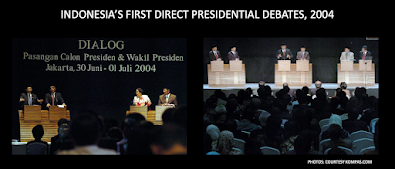It was the year 2004, and Indonesia was going through its first direct presidential elections in the history of its modern politics. I had been a witness to the step by step transition of Indonesia’s political environment, from pre-Suharto days up until where we are today in 2024.
At that time, I was the CEO of the Swara Channel, a part of the media company Jaring Data Interaktif, owned by Peter Gontha, James Castle and myself. Swara (the voice) was Indonesia’s parliamentary television channel, based on C-SPAN. Swara Channel was set up in 1999 with help of funding from USAID and other institutions, and our goal was to promote transparency in the proceedings of the Indonesian Parliament and encourage media savviness for emerging politicians through all kinds of media training programs.
Just a couple of years before this point, President B J Habibie, then Indonesia’s 3rd president, had put in place several major democratic reforms, which eventually led to Indonesia holding direct presidential elections in 2004 with a two term limit. This transition encouraged the creation of many new political parties, and as a result, the first direct presidential election had an unprecedented 5 presidential candidate pairs, Wiranto- Salahuddin Wahid, Megawati Soekarnoputri-Hasyim Muzadi, Amien Rais-Siswono Yudo Husodo, Susilo Bambang Yudhoyono-Jusuf Kalla, and Hamzah Haz-Agum Gumelar.
Being at the helm of Swara channel gave me the opportunity to be involved in several impactful media programs that today is considered to be of historical significance. One such program was the first ever Presidential Candidate Debates. Since the inception of Swara Channel, we had been working closely with Hank Valentino of the International Foundation for Electoral Systems (IFES), the Indonesian Parliament (MPR & DPR) and the Indonesian Election Commission (KPU).
One day, Hank asked me to come over to his office and told me he was discussing with KPU for producing a presidential candidate debate, which was something very new to the Indonesian political environment at that time. He had the US model in mind and wanted my help to explore how to adapt the format to the cultural sensitivities of Indonesia. We met with the Election Commission officials (KPU) and presented a concept, and after much internal discussion, it was accepted.
We then went about preparing for this massive production, as we needed a large studio that could broadcast the program live. We scouted around from large hangars to existing film production facilities, but in the end we decided to go with a television studio. To avoid any partisan affiliations with privately owned stations, we chose the state television TVRI’s studios in Senayan. While KPU contacted the candidate pairs and informed them about the upcoming debates, my team went and met all the tv stations to try and encourage some of them to carry the program live on air. We decided to give a live broadcast feed free of cost to all participating stations and they were allowed to sell advertising.
There was a perceived security risk of having all 5 candidate pairs in one room and hence it was decided to split them into two groups, on two consecutive days. We appointed Ira Koesno to be the moderator and on 30th June 2004, the first day, we presented two pairs Megawati Soekarnoputri-Hasyim Muzadi and Amien Rais-Siswono Yudo Husodo, followed by on 1st July, the second day with three pairs, Hamzah Haz-Agum Gumelar, Susilo Bambang Yudhoyono-Jusuf Kalla, and Wiranto- Salahuddin Wahid.
Surprisingly, all male candidates agreed to appear in full suits and tie, which ended up creating an awkward and stiff atmosphere. Many criticized the first debates to be non confrontational, and more of a discussion with panelists, since arguments did not occur. There seemed to be a cultural boundary quite difficult to cross. However, by and large, all appreciated the effort as a historical precedence had been created.
The elections eventually went into the second round with the leading two pairs Megawati Soekarnoputri-Hasyim Muzadi and Susilo Bambang Yudhoyono-Jusuf Kalla, and this required for another debate to be held for the second round. However, the format got changed with no interaction at all between the two candidates, instead, they answered questions from chosen panelists, making the debate sound more like a monologue. Whatever be the criticism, it ended up creating a record of its kind, with all of the tv stations carrying the debates Live on air.
The debates were largely considered a success and became a topic of hot discussion and varied opinions throughout the elections, which was eventually won by Susilo Bambang Yudhoyono-Jusuf Kalla with a 61% majority. Now in 2023-24, twenty years and four elections later, it has become a much awaited moment of the election. From 2009 onwards, KPU took over the process and awarded the hosting of the debates in turn to the large media conglomerates who were vying for the opportunity to bring it into their studios. Swara Channel ended up handing over the baton to KPU and we have seen many interesting editions of the debates during each election. However, one thing has remained consistent, the format has continuously been tinkered with, with no clear format in place, even as we speak.
Thanks to Swara Channel, QTV and Beritasatu TV, I have had the privilege to be the executive producer of exclusive TV interviews with President B J Habibie, President Abdurrahman Wahid (Gus Nur), Megawati Soekarnoputri, Susilo Bambang Yudhoyono and Joko Widodo as well as former President A.P.J Abdul Kalam from India and former Prime Minister Mahatir Mohamad from Malaysia. At a personal level, it has been a privilege to have the opportunity to be up close to the leaders of our times who have changed the political and democratic history of the region.
Thanks Hank and Peter...
- Sachin V Gopalan
24 Dec 2023, Jakarta Indonesia

